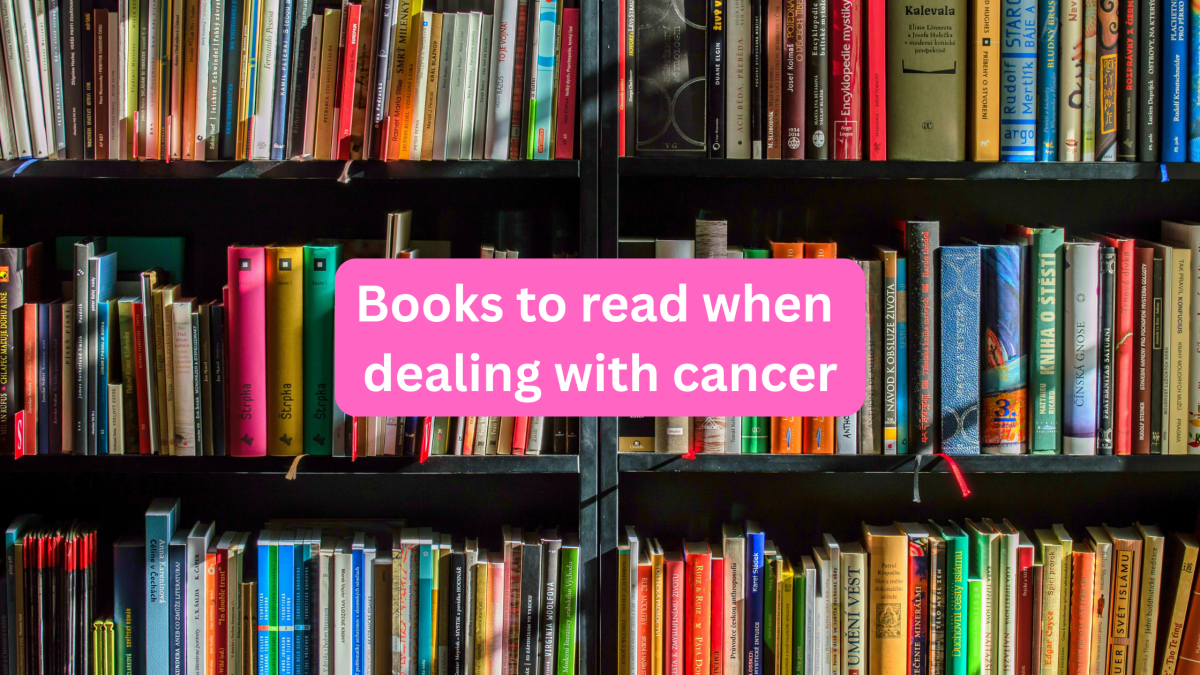
Strengthening Breast Cancer Support Through Collaboration
October 30, 2025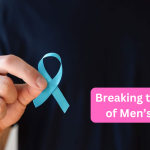
Breaking The Stigma on Men’s Cancers
November 19, 2025MAKNA’s Beginner-Friendly Reading Guide
Your or a loved one’s experience with cancer can be a transformative undertaking. These changes can lead us to seek other voices that help give us more perspective. Be it a medical professional’s prognosis, a loved one’s kind words, or even a stranger’s acknowledgment that we are going through a tumultuous time in our lives.
But voices can also come from books. They don’t necessarily have to be about cancer. They don’t have to be about anything. They can just be another voice other than our own that helps us learn more, not only about ourselves, but to help recontextualize the situation we’re in.
This list brings together some books that we believe can support anyone dealing with cancer, whether you’re living with it yourself or walking alongside someone who is. Some focus on cancer directly, while others simply offer comfort for the journey.
The History of Cancer
The Emperor of All Maladies by Siddarta Muhkerjee
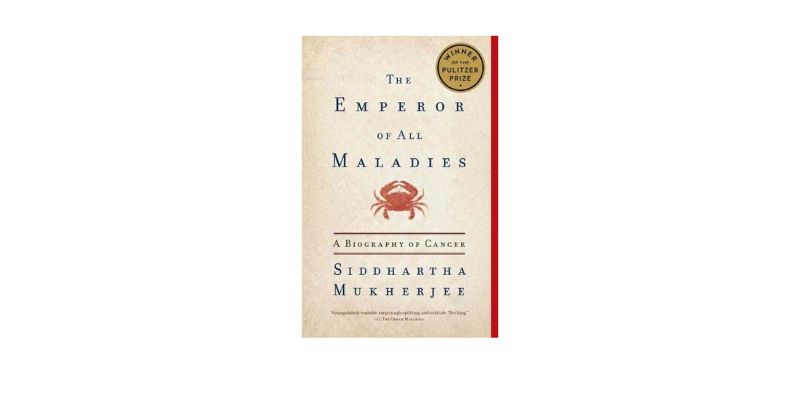
Biologist, physician, and Pulitzer Prize winner Siddharta Mukherjee sought to write this book after a patient of his asked him:
“I’m willing to go on fighting, but I need to know what I’m battling.”
Photo Credit: Litbooks
In his own words, the book is a “biography of cancer” — though it often reads like a military history of cancer. Mukherjee gives form to the formless and presents the disease as one of humanity’s greatest adversaries: an eternal foe whose story is written in victories and defeats, in campaigns spanning continents, and in the lives of both exalted heroes and mourned casualties.
The scope of this book is staggering. From ancient Egyptian scrolls to cutting-edge genomic therapies, Mukherjee weaves science, history, and personal stories into a sweeping tapestry that never loses sight of the human cost behind every discovery. The narrative moves effortlessly between the lab bench, the operating theatre, and the quiet despair of the hospital room.
For readers, The Emperor of All Maladies provides not only an education in the history of medicine but also a lens through which to see cancer as part of humanity’s collective story. It’s a reminder that while progress often feels painstakingly slow, every trial, error, and breakthrough is part of a larger arc toward understanding and healing.
As Mukherjee writes: “Cancer is an ancient disease, but also a deeply human one. To confront cancer is to encounter a part of our own biology, our own mortality.”
The Wisdom of the Youth
Planet Cancer: The Frequently Bizarre Yet Always Informative Experiences And Thoughts Of Your Fellow Natives by Heidi Schultz Adams & Christopher Schultz
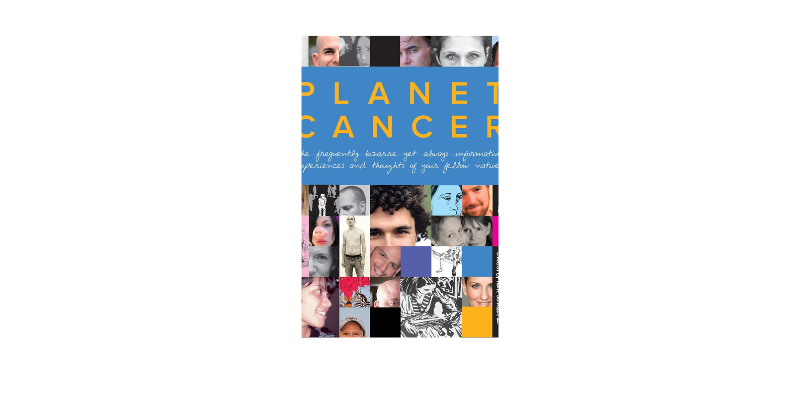
”…my diagnosis was the crash landing…because there’s a completely different language, there’s all these rituals and processes and routines and roles and titles, things you’ve never been exposed to as a young person…”
Heidi Schultz in an interview with Cancer Cactus Society
Photo Credit: Amazon
Planet Cancer was one of the first, burgeoning online communities for cancer survivors, as early as the 2000s. It had that edgy, witty, sardonic approach synonymous with that era of the neonatal internet. A community for young cancer survivors to be as nihilistic, crass, and impertinent as youth itself begot.
Remnants of this can still be read in the book, which shares the now-defunct organization’s name. Written by two siblings, the community and the book’s creation were inspired by Heidi’s experience with Ewing’s sarcoma, a rare & painful bone tumor. An experience she described as a crash landing. An abrupt plunge into an unfamiliar world where she didn’t speak the language.
And so the siblings Schultz set out to help translate. The book takes all of the gravity and difficulty of navigating the cancer treatment path and distills it into a conversation with a sapient yet smarmy teenager. Because ultimately, that’s what the book is.
A series of essays from different members of Planet Cancer all of whom have had a run-in with cancer, the collective wisdom of the youth is showcased in earnest with humor and empathy. In that same interview, the authors stressed the need for the book to be interesting, practical, informative, unique, and excellently written. Laden with tidbits, insights, top 10 lists, and anecdotes, it’s more of a guidebook and arguably indispensable to any young adult facing cancer.
A Long Unexpected Journey
The Lord of The Rings Trilogy by J.R.R. Tolkien

“I wish it need not have happened in my time,” said Frodo.”So do I,” said Gandalf, “and so do all who live to see such times. But that is not for them to decide. All we have to decide is what to do with the time that is given us.”
Photo Credit: Amazon
At first glance, Tolkien’s work may seem far removed from the realities of cancer. But at its heart, The Lord of the Rings is a story about burden, courage, and the strength we find in each other when the road grows heavy.
Tolkien wrote much of the trilogy while recovering from his own wartime traumas, and his themes of despair, endurance, and hope feel eerily universal. The Ring itself can be read as a metaphor for the weight of illness, something that drains, corrupts, and isolates, yet must be carried forward nonetheless. And like Frodo, no one carries such a burden alone; Sam’s loyalty and love remind us that companionship can sometimes be the difference between despair and deliverance.
Tolkien’s prose flows like honey but with deliberation, lyrical and grounded, grand in scope yet intimate enough to feel like a bedtime story. I once picked it up for a casual glance, and before I knew it, I was twenty pages deep, involuntarily carried along by the cadence of his words. His world is vast, but never alienating; it asks us to imagine, but also to reflect.
There is a reason these books are often cited as must-reads. They remind us that even the smallest among us can carry immense burdens, and that no one truly makes the journey alone. For those facing cancer, or walking alongside someone who is, Tolkien’s world offers both an escape and a reflection of the truth we live: that light can still be found, even when the shadows seem overwhelming.
An Uncomfortably Close Look
The Undying by Anne Boyer

“Disease is never neutral. Treatment never not ideological. Mortality never without its politics.”
Photo Credit: Amazon
An unflinching examination of what it’s actually like to be diagnosed with cancer, Boyer’s narrative is unconventional, uncensored, and unwavering in its fury. A lauded poet and poetry editor for The New York Times, the single mother was diagnosed at 41, and six years later, won a Pulitzer for this book.
An atypical approach to a cancer memoir, The Undying presents Boyer’s agonizing experience with triple-negative breast cancer as a critique of everything. From political ideologies and economic policies to gender, class, and creed, nothing is spared from her literary bile and venom.
A flag burning as much as it is a book, The Undying casts the private health care system as a “cancer pavilion,” a well-oiled machine designed to harvest profit from pain. It’s a bleak, upsetting testimony, and it should be mandatory reading for anyone interested in the consequences of privatized health care.
An unflinching examination of what it’s actually like to be diagnosed with cancer, Boyer’s narrative is unconventional, uncensored, and unwavering in its fury. A lauded poet and poetry editor for The New York Times, the single mother was diagnosed at 41, and six years later, won a Pulitzer for this book.
An atypical approach to a cancer memoir, The Undying presents Boyer’s agonizing experience with triple-negative breast cancer as a critique of everything. From political ideologies and economic policies to gender, class, and creed, nothing is spared from her literary bile and venom.
A flag burning as much as it is a book, The Undying casts the private health care system as a “cancer pavilion,” a well-oiled machine designed to harvest profit from pain. It is a bleak, upsetting testimony, and it should be mandatory reading for anyone interested in the consequences of privatized health care.
The Undying: Pain, Vulnerability, Mortality, Medicine, Art, Time, Dreams, Data, Exhaustion, Cancer, and Care should be your next read if you seek empowerment, compensation, indignation, retribution, and rebellion.
When Doctor becomes Patient
When Breath Becomes Air by Paul Kalanithi

“Years ago, it had occurred to me that Darwin and Nietzsche agreed on one thing: the defining characteristic of the organism is striving.”
Photo Credit: Amazon
Born in New York to Indian immigrant parents, Paul grew up in Arizona with his two brothers, where he read 1984 at the age of ten. A polymath, he studied history, philosophy, the arts, science, and medicine, even winning the Lewis H. Nahum Prize for his work on Tourette’s syndrome. After nearly a decade of training as a neurosurgeon, Paul Kalanithi died of metastatic lung cancer in March 2015. His book was published posthumously a year later. He would have been 38.
This memoir follows Paul as his world is turned upside down, and as he wrestles to find meaning in both a life well lived and a death fast approaching. The author was an art student before a medical one, and it shows in his writing. Medical terminology is presented raw and unsettling, his philosophies shared personably and intimately, all with the undertone of a comfortable morbidity that only someone who has accepted his death can achieve.
Interwoven with his personal narrative are also his observations as a medical professional — the dual existence of both treater and treated. The book stands as a testament to the human spirit, showing how the indomitable will within us can make death seem less a conclusion than a companion.
By the time you approach the closing chapters of When Breath Becomes Air, you not only mourn Paul’s passing, but also feel the weight and wonder of a life lived with purpose, even in its final days.
A Cosmic Comedy
The Hitchhiker’s Guide to the Galaxy by Douglas Adams

“The story so far:
In the beginning the Universe was created.
This has made a lot of people very angry and been widely regarded as a bad move.”
Photo Credit: Goodreads
On the outset, it may seem odd to recommend a book about depressed robots, galactic hitchhikers, and bureaucratic aliens to someone grappling with cancer, but this cult classic is more than just a comedy; it strips life down to its most absurd essentials.
There are few books that can claim to be as effortlessly charming, hysterically whimsical, and bitingly satirical as the first of Adams’ comedy sci-fi pentalogy. It follows the life of Arthur Dent, the last surviving human from Earth, and his misadventures with Ford Prefect, an alien researcher of the remnants of humankind, Marvin the paranoid android, and Tricia McMillan.
Beginning as a radio series on the BBC, Adams initially imagined a string of tales in which Earth ended in different ways. But he kept circling back to the idea of a guidebook, not for Greece, but for the galaxy. A notion he allegedly stumbled upon while lying drunk in a field in Innsbruck.
The message of these books is simply that life rarely makes sense, and sometimes the only way through the chaos and peril of it all is to laugh at it. Between the pages, despair meets delight, and the unknowable becomes oddly comforting.
Through this lens, Adams manages to lead the reader to ask themselves deeper questions about the paradoxical nature of existence, philosophy, technology, our identity as a species, and how all of it measures against the vastness and variety of the galaxy.
The Cost of Progress
The Immortal Life of Henrietta Lacks by Rebecca Skloot
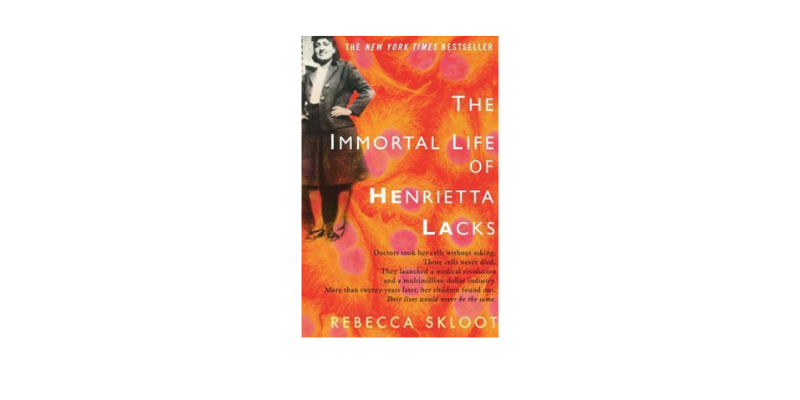
“…if our mother cells done so much for medicine, how come her family can’t afford to see no doctors?”
Deborah Lacks, Henrietta’s daughter
Who owns your cells? This is just one of the thought-provoking questions asked by Skloot in this retelling of one person’s unwitting involvement in one of the most revolutionary breakthroughs in modern medicine. Henrietta Lacks’ cancer cells were the source of the first ever immortal cell line. Named HeLa in her honor, these lab-grown cells are still used today, 74 years after her death. Their use has contributed to polio and COVID-19 vaccines, studies on AIDS and cancer, and has also raised the question of what it means to live forever.
Skloot, over the course of a decade, studied and met with the Lacks family and representatives from Johns Hopkins, and from this, built a cohesive narrative that manages to show the hidden complications when it comes to pioneering medical research. And then she asks the reader to ask themselves where the boundaries lie between the greater good of a society and an individual’s rights and well-being.
Winner of over 60 book awards, honored by the Heartland Prize, and adopted as common reading at over 125 universities in the US, and even birthing a movie, this biography of the first ever immortalized human cell line is mandatory reading for anyone interested in learning about science, medicine, immortality, and the ethics of race, class and gender in medical research.
Final Thoughts
If you or a loved one is facing the challenges of cancer, the online community is a place to chat with others who know what you’re going through. Consider joining forums, support groups, or even a book club to share your feelings and experiences and find support from others who understand what you’re going through. If you’d like to learn about what we do here at MAKNA, you can find out more here.
“With all that is going on in my life and how dark it has become, I can honestly say these books, these worlds with enemies and challenges that can be beaten have kept me going.” – Q, diagnosed with bowel cancer

